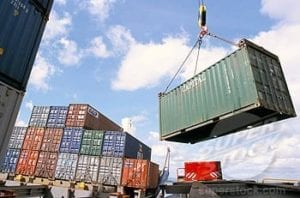The launch of a high-tech cargo container scanner is an “end game” for the trade of illicit goods, says South African Revenue Service (SARS) Commissioner Tom Moyane.
The commissioner unveiled a R38 million scanner at the Port of Cape Town on Wednesday. The scanner, which uses radiation and x-ray technology to scan the contents of cargo is believed to be the first in the world that has its capabilities. Detering those who would like to avoid paying their fair value in terms of customs. “Customs by nature and by definition all over the world is the first line of defence for every country, but certainly and most importantly it is also a source of revenue. “As we speak, from a SARS perspective, from the revenue that we collected last year of R986 billion, 10% comes from customs. “We believe that we could have collected more. What we need to do is to enhance and up the game so that we deter those who would like to avoid paying their fair value in terms of customs. “Equally, we would like to inform our stakeholders that we would like to facilitate trade as smoothly as possible and that you are sure that the goods that we receive are what has been declared to our officials,” Moyane said. Constructing the scanner The site where the scanner is situated at the port took in excess of 10 months to prepare while the construction of the actual scanner took six months. When a cargo container is trucked into the customs area, it is directed at the scanner, which has been assembled in a reinforced concrete structure built to contain radiation. Once it has been ensured that a truck driver has vacated the vehicle, the saddle-shaped machine is turned on and moves over the container and customs officials working from the operations room are able to screen the contents.Speaking to SAnews after the launch, Moyane said the scanners were top of the range. “I think they are equal to any type of scanner that we have in the world in other tax and customs administrations.
“It will detect 1mm copper, rhino, contraband like medicines, tablets, it will detect cocaine, it will detect a number of illegal things that we are able to calibrate into our systems. “These are meant to create an environment where we are the first line of defence in terms of stalking narcotics or any other thing that is illegal, CDs included. “The scanners will also detect wrongful declaration of contents.” Impact on the tax gap He said the technology will be coupled with sniffer dogs that officials will deploy into the containers as and when it is decided to open them. As an example, at the Durban port, the scanner has been able to assist officials detect illicit cigarettes in a container that was declared to be carrying biscuits. Moyane said SARS has a team that is assessing the impact that the scanners will have on the tax gap. “We believe that the tax gap is the big thing that we will be able to deal with,” said Moyane, adding that this would mean more money to fund government programmes. He said more scanners will, going forward, be installed at other ports of entry across the country.





